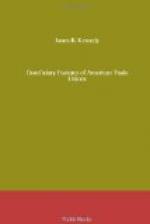The more complete the system of benefits the less is the difficulty in preventing the payment of fraudulent claims. A union such as the Cigar Makers or the Typographia has a comparatively small problem in administration as compared with that of a union like the Iron Molders. Since the Iron Molders do not maintain an out-of-work benefit unemployed members are tempted to try to secure sick benefits. Even in the Cigar Makers the sick benefit and the out-of-work benefit are used as a form of superannuation relief. The addition of a superannuation benefit would lower the expense of maintaining the sick and out-of-work benefits.
The administration of trade-union benefits is subject to certain rules imposed by the statutes of the various states. All the commonwealths of the United States regulate by law the conduct of insurance business. In this regulation, distinction has necessarily been made between regular insurance companies and that class of organizations known as fraternal or beneficiary societies. The trade organizations described in this monograph as maintaining insurance or benefit departments fall under the latter class.
The unions paying insurance, as distinguished from benefits, have conformed to certain requirements of these laws, either by incorporating their insurance departments or by modifying the rules of the organizations in harmony with special state regulations for fraternal insurance companies.
Prior to 1894—from December, 1867, to 1894—the Brotherhood of Locomotive Engineers had its headquarters in the state of New York. In the latter year the State Superintendent of Insurance notified the Brotherhood that incorporation of the insurance department was necessary for the continuance of the business. In consequence thereof the central office of the Brotherhood was transferred to Cleveland, Ohio, and on the twenty-second of February, 1894, the insurance department was incorporated under the laws of the state of Ohio as a separate organization.[233] Similarly, the Conductors were forced to incorporate by the pressure of the state laws. In December, 1885, the Order moved its central office from Cedar Rapids to Chicago. In order to strengthen its power and to broaden its influence, the Order, in 1886, applied for a certificate of incorporation under the laws of the state of Illinois. The Secretary of State refused the certificate on the ground that the insurance regulations of the Order were not in accordance with the state laws, and requested that these be changed and that the insurance department be incorporated as a separate organization. The Secretary of State was willing to incorporate the Order under the Act of 1872, provided the Order eliminated from the object of organization the clauses referring to the payment of benefits or indemnity; or he was willing to issue a charter based on the Act of 1883 which provided that only such powers could be taken as are specifically granted therein, namely, “the




